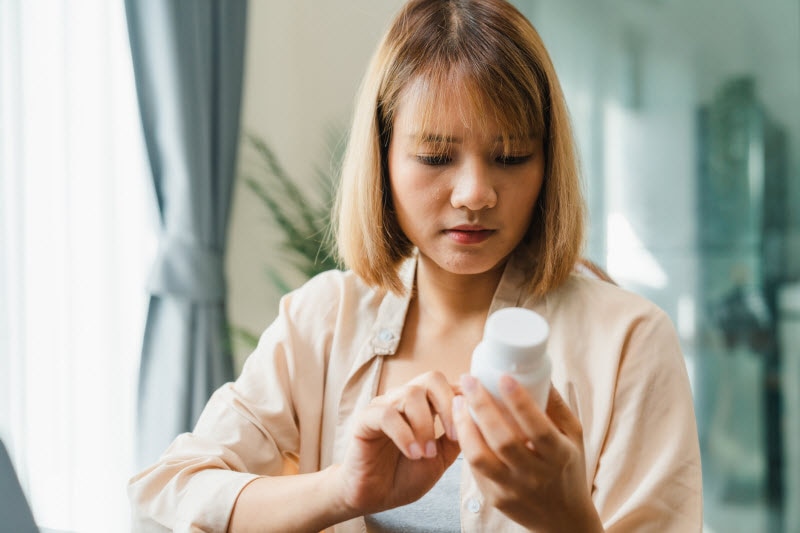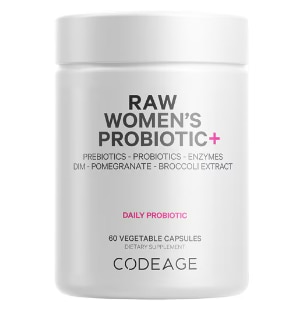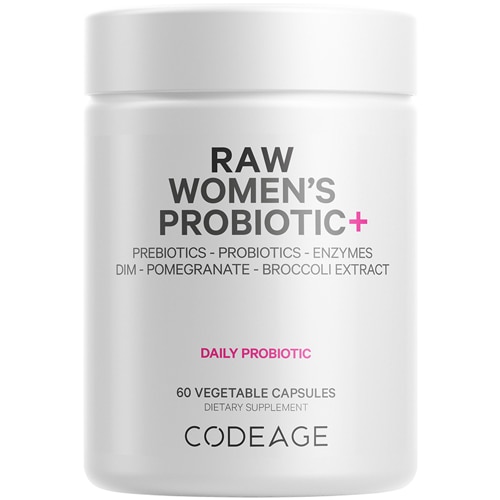Probiotics are helpful bacteria essential for
maintaining a healthy gut. There are many ways you can get more of these beneficial organisms in your diet, including raw
fermented foods, cooked cured foods and supplements.
Probiotic supplements are also available in raw, unprocessed form. Unlike their processed counterparts, raw probiotics are live microorganisms that haven't been subjected to heat or other treatments. This means they retain their natural, potent qualities, which can help support your digestive and immune systems.
†

Including raw probiotics as part of a healthy diet and active lifestyle can support digestive and immune system health and overall wellbeing.
† Ahead, you can learn more about what makes raw probiotics so special, explore their benefits, and learn how they are made.
What are raw probiotics?
Raw probiotics are live microorganisms kept in their most natural state and are not subjected to heat or chemicals that might destroy these beneficial bacteria. They don’t undergo artificial treatments like heating, cooking or adulteration with binders or fillers. In their raw form, they contain live nutrients, enzymes and probiotic strains that may make them more potent and easier for the body to absorb.
†
Raw probiotics occur naturally in many foods and can be found in supplement form. Here are some examples:
- Fermented foods: Foods like sauerkraut, kimchi, kefir and yogurt are rich in raw probiotics. These foods undergo a natural fermentation process that encourages the growth of beneficial bacteria.
- Supplements: There are also dietary supplements available that contain raw probiotics. Manufacturers carefully formulate these supplements to maintain the live bacteria without heat treatment.
- Raw dairy products: Unpasteurized milk and cheese can also be good sources of raw probiotics, but due to potential health risks, it’s best to be cautious.
Benefits of raw probiotics
Raw probiotics support your health in many ways that can make them a valuable addition to your health routine. Here are some of them:
Maintains natural state
One notable appeal of raw probiotics is that they maintain their natural state with no exposure to high temperatures or other processes that could change their characteristics. As part of a balanced diet and healthy lifestyle, raw probiotics may help maintain the balance of bacteria in your gut.
†
Absorption and bioavailability
Raw probiotics are in their most natural form, which may help them survive the stomach's acidic environment and reach the intestines.
† Individual results may vary, so it's best to talk to a healthcare provider before taking dietary supplements.
Supports digestive health†
Raw probiotics can help repopulate your digestive tract with beneficial, health-promoting bacteria, which supports colon health, regular bowel movements and relief from common digestive discomforts like bloating, gas and occasional constipation.
†
Helps maintain immune system health†
A large part of your body's immune system is in your gut, which makes gut health very important for your overall immunity. Raw probiotics can help support your immune system by balancing the microorganisms in your gut. A robust immune system helps protect overall health in many ways.
†
Blood sugar support†
New research suggests that
gut bacteria may be linked to type 2 diabetes.
† Probiotics can help maintain healthy blood sugar levels already in the normal range by supporting gut-bacteria balance.
†
Support vaginal health†
Bacteria are everywhere, including the vagina. Probiotics can help keep the vagina healthy when part of a balanced diet and healthy lifestyle. This is because they help maintain a good balance of bacteria in the body, which is beneficial for vaginal health.
†
How probiotics are added to foods and supplements
Many foods naturally contain raw probiotics due to the fermentation process. Foods like sauerkraut, kimchi, kefir, and yogurt are made by fermenting vegetables, milk or other ingredients, which encourages the growth of beneficial bacteria naturally found in the environment. Of course, people have used natural fermentation for thousands of years to preserve foods since the good bacteria created during the process prevent harmful organisms that would otherwise spoil the food at bay.
When making dietary supplements, methods like freeze-drying, time-delay encapsulation and refrigeration can help keep the bacteria alive and well, even through your stomach acid. Raw probiotics come from whole food sources that undergo natural fermentation. Manufacturers use yogurt, kefir, or other naturally probiotic foods or cultivate live strains to concentrate and blend into a powder. Once the probiotics are in powder form, they typically undergo encapsulation to protect them from exposure to air, light and moisture to preserve their viability.
Sometimes, manufacturers use special techniques and add other ingredients that help probiotics survive passage through the stomach to reach the intestines and begin working. For example, certain types of probiotics, like lactobacillus, bifidobacterium and streptococcus, are naturally able to survive in the stomach because they resist stomach acid.
Spore-forming probiotic strains such as
Bacillus coagulants and Bacillus subtilis are also more hardy due to their endospores, which help them survive in inhospitable environments. This resilience allows them to travel from the stomach to the intestines, so they are typically included in many supplements.
Sometimes, probiotic supplements include milk and milk proteins because of their ability to buffer stomach acids. Probiotics that contain dairy proteins in their raw form may help the beneficial bacteria reach their destination intact.
Another good strategy is to use delayed-release formulations, which protect the probiotics as they pass through the stomach and only release them when they reach the less acidic intestines. Also, taking a higher dose of probiotics, measured in colony-forming units (CFU), can increase the chances that enough bacteria will survive the journey through the stomach.
How to choose high-quality raw probiotic products
When looking for a good raw probiotic supplement, there are a few things to think about. First, check the colony-forming units (CFUs) to ensure you get enough organisms in one serving. Also, look for the right
species and strain of bacteria that match your needs.
Look for probiotic supplements that specify the strains of bacteria they contain and their CFU count. Choose reputable brands that are transparent about their sourcing and manufacturing processes.
It’s a good idea to select a supplement that combines raw probiotics with
prebiotics, which are non-digestible fibers that feed beneficial bacteria and can enhance their effectiveness. Foods such as garlic, onions, and bananas are good sources of prebiotics.
Consider the best way for you to take the supplement, whether it's capsules, tablets, powders or liquid. Check if and how the supplement is tested for quality and purity. Know the
storage requirements for your probiotics.
Also, check that the supplement is made in a GMP-certified facility to ensure high-quality standards. Lastly, look for supplements tested by a third party to confirm their quality and purity independently.
Codeage Raw Women's Probiotic supplement meets all of these qualifications and contains raw whole-food probiotic strains that survive passage through the stomach. It delivers 100 billion CFUs of probiotics and prebiotics and contains enzymes like lipase and protease for added digestive support.
†These statements have not been approved by the Food and Drug Administration. These products are not intended to diagnose, treat, cure or prevent disease.
Featured Product
 Including raw probiotics as part of a healthy diet and active lifestyle can support digestive and immune system health and overall wellbeing.† Ahead, you can learn more about what makes raw probiotics so special, explore their benefits, and learn how they are made.
Including raw probiotics as part of a healthy diet and active lifestyle can support digestive and immune system health and overall wellbeing.† Ahead, you can learn more about what makes raw probiotics so special, explore their benefits, and learn how they are made.




